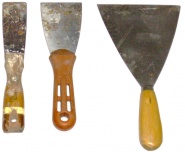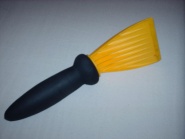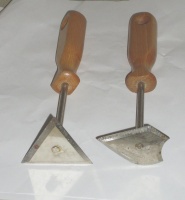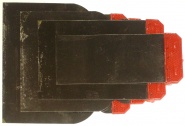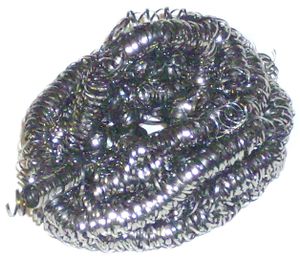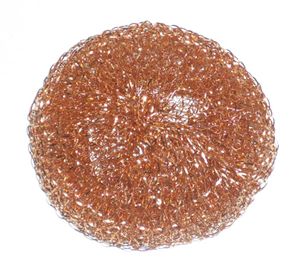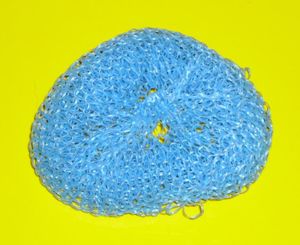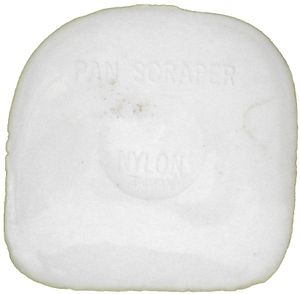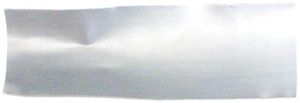Difference between revisions of "Scraper"
| (10 intermediate revisions by the same user not shown) | |||
| Line 2: | Line 2: | ||
| − | [[image:3 Scrapers 216-9.jpg| | + | [[image:3 Scrapers 216-9.jpg|right|185px|Filling knives / scrapers]] |
| − | [[image:Glass scraper 264-5.jpg| | + | [[image:Glass scraper 264-5.jpg|right|185px|Glass scraper]] |
| − | [[image:800px-Eiskratzer.jpg| | + | [[image:800px-Eiskratzer.jpg|right|185px|Plastic ice scraper]] |
| − | [[image:2 scrapers 224-3.jpg| | + | [[image:2 scrapers 224-3.jpg|right|185px|Shave hooks]] |
| + | [[image:Scrapers continental 5937-3.jpg|right|185px|Continental scrapers]] | ||
==Uses== | ==Uses== | ||
| Line 43: | Line 44: | ||
===Plastic=== | ===Plastic=== | ||
| − | [[:Category:Plastics|Plastics]] vary significantly in hardness, and are softer than metals. Sometimes a thin softer plastic finish on a hard surface makes its softness non-obvious - non-stick [[ | + | [[:Category:Plastics|Plastics]] vary significantly in hardness, and are softer than metals. Sometimes a thin softer plastic finish on a hard surface makes its softness non-obvious - non-stick [[Kitchen|cookware]] is an example. Plastics also frequently need to retain their shine to look good. For these reasons only the softest of scraper material should be used occasionally on plastic (eg wood & fingernails) with [[detergent]]s & other [[chemical]] cleaning methods much preferred. Clear plastics should not be scraped at all, just one scraping session can ruin their appearance. |
===Aluminium=== | ===Aluminium=== | ||
| − | [[:Category:Metal|Aluminium]] is a fairly soft metal. It tends to become pitted in use, and loss of shine on such surfaces is a non-issue. | + | [[:Category:Metal|Aluminium]] is a fairly soft metal. It tends to become pitted in use, and loss of shine on such surfaces is a non-issue. Its best not to use steel wool or bristles on ali, they leave fragments on steel behind, causing corrosion to the ali later. |
====Linished==== | ====Linished==== | ||
| Line 59: | Line 60: | ||
===Plastic coated sinks=== | ===Plastic coated sinks=== | ||
| − | The surface is soft and should never be scraped. [[Chemical]] methods are available for all the usual typers of muck. See [[Cleaning | + | The surface is soft and should never be scraped. [[Chemical]] methods are available for all the usual typers of muck. See [[Cleaning sinks]]. |
===Chrome=== | ===Chrome=== | ||
Chrome can be scraped with a copper scourer. Steel scourers ruin the finish. | Chrome can be scraped with a copper scourer. Steel scourers ruin the finish. | ||
| + | |||
| + | ===Nonstick cookware=== | ||
| + | Nonstick cookware has a deceptively soft finish that is routinely ruined by scraping during [[cleaning]] & cooking. Don't scrape it with anything harder than a finger nail, and don't do that unless there is really no other workable option. Use [[wood]] or suitable [[plastic]] spatulas for cooking, never metal. Soak well before cleaning with cloth or sponge and rely on chemicals to do the work. | ||
==Scraper Materials== | ==Scraper Materials== | ||
===Steel scraper=== | ===Steel scraper=== | ||
| + | [[image:1 Scraper 0216-10.jpg|thumb|Steel scraper]] | ||
| + | |||
* tough | * tough | ||
* popular | * popular | ||
| Line 74: | Line 80: | ||
===Iron wool=== | ===Iron wool=== | ||
| + | [[image:Steel wool, medium grade hank 5651-3.jpg|thumb|Iron wool]] | ||
| + | |||
* tends to cause rust staining where stored | * tends to cause rust staining where stored | ||
* splinters are a problem | * splinters are a problem | ||
| − | * too hard for | + | * too hard for all modern surfaces |
* May be used with [[paint]] strippers | * May be used with [[paint]] strippers | ||
* 4-5 mohs | * 4-5 mohs | ||
| Line 109: | Line 117: | ||
===plastic scraper=== | ===plastic scraper=== | ||
| − | [[image:Nylon scraper 4286- | + | [[image:Nylon scraper 4286-4.jpg|thumb|Nylon scraper]] |
* soft scraper | * soft scraper | ||
* removes weaker/softer forms of dirt | * removes weaker/softer forms of dirt | ||
| + | * aka pan scrapers | ||
* always to hand: a cut edge on some plastic kitchen waste works if you run out | * always to hand: a cut edge on some plastic kitchen waste works if you run out | ||
===Aluminium scraper=== | ===Aluminium scraper=== | ||
| − | + | [[image:Ali scraper 5787-3.jpg|thumb|Ali can scraper]] | |
| + | |||
* 2.5-3 mohs, softer than copper | * 2.5-3 mohs, softer than copper | ||
* Useful for surfaces that won't tolerate anything harder | * Useful for surfaces that won't tolerate anything harder | ||
| + | * Good for removing paint from glass | ||
* the scraping edge soon wears in use | * the scraping edge soon wears in use | ||
| + | * Pieces from an ali drinks can cut out with scissors work well | ||
| + | * When using drinks can ali, it self sharpens as it wears | ||
==Ad hoc scrapers== | ==Ad hoc scrapers== | ||
Latest revision as of 03:09, 29 September 2018
Scrapers remove paint and dirt. Anything will scrape, but a bad scraper choice ruins surface finishes or makes work difficult.
Uses
Levering
Filling knives can be used as levers where their thin blade fits small gaps, but only low force is needed. Use of multiple scrapers increases total levering force. Wide blades and low force minimises risk of damage to the workpiece. Useful for removing decorative timber trim.
Hardness
Scraper behaviour is all about relative hardness. When 2 materials scrape against each other, the softer one deforms, with little effect on the harder one. This means 2 things:
- to be an effective cleaner the scraper must be harder than the dirt/paint etc
- to avoid risk of damage the scraper should be softer than the workpiece
Hardness is measured in mohs, a non-linear scale with with diamond at 10 mohs, and soft talc at 1 moh.
Surface damage
With many surfaces, microscopic damage matters. It causes:
- loss of gloss or shine
- for see-through materials, complete loss of clarity
- it makes cleaning rather harder, which is an issue in the kitchen, and with plastic surfaces
- gradual wearing off of thin surface coatings
Wood
For some surfaces, microscopic damage doesn't matter. This is true of wood, and thus metal scrapers are usually used. The tough hard steel is long lived and rarely needs its edge grinding. Wood is low on the mohs scale at under 2.5.
Glass
Glass and see through plastic are especially vulnerable to scraper action, since the results of surface damage are so visible. Glass is a hard material at 5.5 mohs, but steel scrapers can sometimes cause scratching and abrasion as they're just as hard. Where glass is puttied it doesn't matter, as its covered over, and tiny scratch marks are a very small matter. Where the effects are more noticeable, steel scrapers are better avoided. Copper and aluminium edges can remove paint and dirt, albeit with a fair bit of wear to the scraper edge.
Plastic
Plastics vary significantly in hardness, and are softer than metals. Sometimes a thin softer plastic finish on a hard surface makes its softness non-obvious - non-stick cookware is an example. Plastics also frequently need to retain their shine to look good. For these reasons only the softest of scraper material should be used occasionally on plastic (eg wood & fingernails) with detergents & other chemical cleaning methods much preferred. Clear plastics should not be scraped at all, just one scraping session can ruin their appearance.
Aluminium
Aluminium is a fairly soft metal. It tends to become pitted in use, and loss of shine on such surfaces is a non-issue. Its best not to use steel wool or bristles on ali, they leave fragments on steel behind, causing corrosion to the ali later.
Linished
Linished aluminium has very shallow scratch marks in precise alignment, and rearranging the pattern ruins the visual effect. Such decorative surfaces should not be scraped other than with something much softer, ie a plastic scraper. Scrape in accurate alignment with the existing marks, as scratches can occur.
Polished
Polished aluminium should not be scraped at all. Any scraping can be expected to visibly affect the surface. Chemical methods should be used. In principle aluminium can be refinished after scraping, but such refinishing isn't normally worthwhile.
Stainless steel
May be scraped with aluminium or copper, or softer plastic scrapers. Scraping with steel is ok where a fine finish isn't needed, but it ruins the finish on stainless steel splashbacks, polished cutlery etc. Copper scourers are a good general purpose cleaning scraper for steel.
Plastic coated sinks
The surface is soft and should never be scraped. Chemical methods are available for all the usual typers of muck. See Cleaning sinks.
Chrome
Chrome can be scraped with a copper scourer. Steel scourers ruin the finish.
Nonstick cookware
Nonstick cookware has a deceptively soft finish that is routinely ruined by scraping during cleaning & cooking. Don't scrape it with anything harder than a finger nail, and don't do that unless there is really no other workable option. Use wood or suitable plastic spatulas for cooking, never metal. Soak well before cleaning with cloth or sponge and rely on chemicals to do the work.
Scraper Materials
Steel scraper
- tough
- popular
- good where a fine surface finish doesn't matter
- available in various blade shapes for removing paint from wood.
- 5.5 mohs
Iron wool
- tends to cause rust staining where stored
- splinters are a problem
- too hard for all modern surfaces
- May be used with paint strippers
- 4-5 mohs
Stainless steel scourer
- too hard for most modern surfaces
- too weak a structure to get much pressure on the edges
- 5.5 mohs
Copper scourer
- good for cleaning steel
- can also be used for exfoliation
- copper has some antibacterial effect
- removes rust spots from steel
- 3-3.5 mohs
Plastic scourer
- The softest of all scrapers.
- Useful for general purpose cleaning
- When using scrap material, use only thermoplastics (flexible plastics).
finger nail
- 2.5 mohs, a fairly soft scraper
- always to hand
- of limited use
plastic scraper
- soft scraper
- removes weaker/softer forms of dirt
- aka pan scrapers
- always to hand: a cut edge on some plastic kitchen waste works if you run out
Aluminium scraper
- 2.5-3 mohs, softer than copper
- Useful for surfaces that won't tolerate anything harder
- Good for removing paint from glass
- the scraping edge soon wears in use
- Pieces from an ali drinks can cut out with scissors work well
- When using drinks can ali, it self sharpens as it wears
Ad hoc scrapers
Plastic: expired credit card, offcut of thermoplastic (eg from kitchen bin)
Aluminium: offcut of sheet material.
Ad hoc bladed scrapers are usually blade plus mole grips, these aren't recommended due to the ease of blade slippage and consequent damage or injury.
Power scrapers
Power scrapers use a vibrating metal blade. Combination sander/scrapers are available.
About shave hooks
Shave hooks are often sold blunt, and often not even with the edge properly ground to shape. In this condition they're very ineffective, and need grinding and sharpening to be useful.
